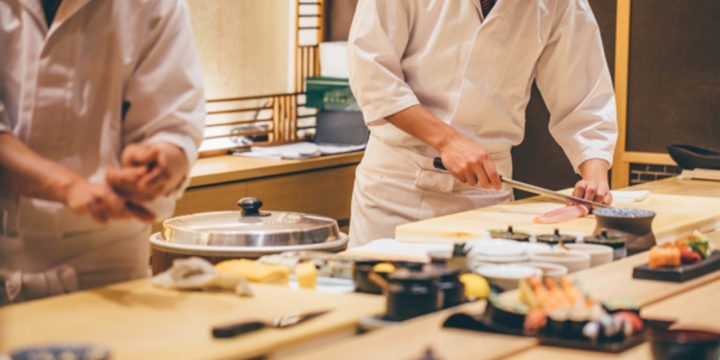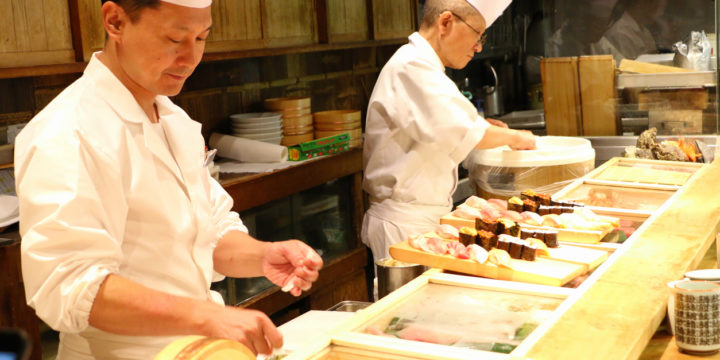How to Retain Your Japanese Chefs and Prevent New Applicants from Declining Your Job Offer
Many hiring managers at restaurants can be struggling with the cases in which an ideal Japanese candidate declines their job offer or a new Japanese chef quits shortly after being employed.
We hope that this article helps you understand Japanese chefs’ concerns with a job abroad and avoid losing a candidate or a newly hired chef.
1. Japanese Chefs Declining the Offer


■ More than 20% of Japanese Chefs Decline a Job Offer?
According to the 2021 survey released by Mynavi, a famous staffing company in Japan, 15.7% of the candidates did not accept the offer from the companies that provided an in-person interview, while 22.7% declined the offer from the companies that held only an online interview.
This result includes other companies as well as restaurants, but our sense is that the ratio is not that far from those regarding Japanese chefs. Since the hiring of Japanese chefs can be conducted through an online interview, you should expect to see more than 20% of the candidates end up declining the offer.
■ Why Is the Job Offer Declined and What Should be Done?
The reasons for Japanese chefs to decline the offer do not differ much from chefs in other countries. The main reasons include the disagreement about salary or working conditions, a bad impression of the interviewer, and a job offer from another restaurant.
Yet, there are two important points to keep in mind in order to avoid losing a candidate: Japanese people tend to refrain from emphasizing their own thoughts during the interview and those who have not been outside Japan face a higher psychological hurdle in working overseas than the employer can imagine.
For example, even though the proposed salary or working conditions are not satisfactory, the applicant may not feel comfortable with negotiating at the interview. After going through the interview without making a counteroffer, some people may decline the offer since the conditions are not good enough.
We recommend that you strategically gather the information about the applicant’s current salary and working conditions or if the person is going through interviews at other restaurants. Then, you should propose conditions that would meet the applicant’s expectations. Looking at their facial expressions and other signs will help you to understand if the offer is acceptable or not.
Another point to emphasize is the mental toll on those who have never lived abroad. It is said only 20 to 25% of Japanese people have a passport. Many people are not familiar with a life abroad or communication with a language other than Japanese.
If a job applicant is not fluent in English, try to speak slowly in simple language. There are also cases in which the candidate accepts the offer, but his/her family opposes the decision. As it may happen that the candidate has to decline the offer for this reason, the interviewer may want to ask about what the family thinks about the job.
After the offer is accepted, it is essential to contact and follow up the person regularly with LINE or other messaging apps to help with the visa application for entering the country and the preparation for the new life.
2. Japanese Chefs Leaving the Job


■ Less Than 30% of Japanese People Stay for 3 Years or Longer?
The retention rate of restaurant staff in Japan is low. According to the 2015 survey by a website for the restaurant business industry, about 40% of the staff work at the same place for more than 3 years. As for the Japanese chefs working abroad, it is being whispered in the industry that less than 30% stay after 3 years of employment. Retaining Japanese chefs is the most important task for a restaurant to keep its business on track.
■ Why Do People Leave and How Do We Stop It?
〇 Actual Working Conditions Different from the Accepted Offer
We often hear from Japanese chefs working abroad that they decided to leave the job soon, since the working conditions were so different from what they had been told. In particular, the issues regarding salary and hours tend to make the chefs leave shortly after being employed. When you talk about salary, you should give gross pay, net pay, and the estimate of living expenses beforehand. For working hours, we recommend that you provide realistic conditions that can be actually realized. If there could be unexpected overtime hours, you should be honest about that factor during the interview.
We need to be careful about these conditions, since if the chef constantly feels “This is not what I signed up for,” a sense of distrust toward the restaurant builds up and causes the person to leave the job.
〇 No Proper Recognition of Performance
Some Japanese chefs are not good at emphasizing the value of their performance to the manager. The manager tends to assume that these chefs are satisfied with the current situation, since they do not ask for better treatments. Yet, it is very likely that some of the chefs are not happy with the status quo and waiting for more recognition. Instead of leaving alone Japanese chefs who do not speak up often, you may want to hold regular meetings so that each side can be clear about what they expect from each other.
〇 Fatigue of Living Abroad
Those who were born in Japan and had not spent much time abroad can suffer from a tremendous amount of stress by living in unfamiliar countries. It may not be a major concern in a big city that has a community of Japanese people where people can speak in Japanese. Yet, at a restaurant in an area inhabited by few Japanese people, the manager may be able to come up with a plan to keep the chefs. One idea is to give away a round-trip ticket to Japan regularly for a refreshing trip. Even though a round-trip ticket to Japan is too costly, some restaurants offer free travel to a nearby city that has Japanese communities.
No matter if the chefs are declining the offer or leaving the job quickly, the manager may find it difficult to figure out the reasons, which can stem from particular traits of Japanese people. If you want to avoid losing a candidate or to retain your chefs for a long time, please contact Washoku Agent!
3. What If I Have a Problem in Hiring?
“I do not know what my restaurant should feature to attract Japanese chefs.”
“I have an idea of the chefs I am looking for, but I do not know how to find them.”
“We tried to recruit on our own before without success, so we want to find a truly skillful chef this time.”
“Since no staff member speak Japanese, we want to entrust the whole task of hiring Japanese chefs to someone else.”
If you have a problem in recruiting Japanese chefs, feel free to contact us Washoku Agent!
- What Japanese Cuisine Categories Are There in the Michelin Guide as of September 2022?
- Looking for a Japanese Chef Who Can Create Vegan/Vegetarian Menu?
Do you want to know more about Global Japanese Cuising Market?
If Yes, please submit this form and you will receive it by email.
on WhatsApp.





